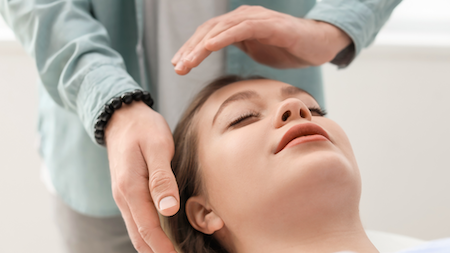Using Reiki Therapy To Help Chronic Conditions

Reiki therapy is a form of alternative medicine that has gained popularity recently for its ability to provide natural and non-invasive healing. It is based on the principle of energy transfer, which is believed to promote physical, emotional, and spiritual well-being.
Does Reiki work? Read on to see the science behind Reiki therapy and its use in treating chronic conditions such as cancer and diabetes. We will also provide tips for practicing Reiki therapy and precautions to remember.
What is Reiki Therapy?
Reiki or Usui Reiki is an alternative medicine based on energy transfer to promote healing. Dr. Mikao Usui created the practice in the 20th century. Since then, it has gained popularity worldwide.
Reiki practitioners believe they can channel energy into a person’s body by placing their hands on or above them. The theory is that the transfer of energy balances the person’s energy field. This leads to relaxation, reduced stress and pain, and improved overall well-being. The belief is also that the energy transfer stimulates your body’s natural healing abilities.
How Does Reiki Therapy Work in Some Chronic Conditions?
Reiki healing involves the practitioner using their hands to transfer energy into the person’s body. The person receiving Reiki typically lies down or sits comfortably and relax. The practitioner then places their hands on or near the person’s body in various positions, typically starting at the head and moving down the body. This process can last anywhere from 15 minutes to an hour.
The practice is becoming popular when treating chronic conditions. For example, Reiki may help alleviate some of the symptoms and stress associated with diabetes. Reiki may help improve circulation, which can benefit people with diabetes at risk of developing circulation problems. It also helps reduce stress, positively impacting blood sugar levels and overall health.
Other chronic conditions that reiki therapy helps include;
- Arthritis: Reiki may help relieve pain and stiffness and improve joint mobility in people with arthritis.
- Asthma: Stress and anxiety are common triggers of asthma symptoms. Reiki therapy helps people with asthma to relax and relieves them of these triggers.
- Cancer: Reiki reduces discomfort, improves sleep, and alleviates pain in people undergoing cancer treatment.
Does Reiki Work?
There have been some research studies conducted on the effectiveness of Reiki. One research of 202 participants showed positive results in the use of Reiki. The result showed that the group that used Reiki therapy for chronic pain showed better symptom resolution than the control group. Another study of 120 participants showed that Reiki might positively affect symptoms such as pain, anxiety, and depression.
Regarding chronic conditions, there have been studies to inspect the effectiveness of reiki therapy. For example, there was research on the use of reiki therapy on oncology patients. The participants used reiki therapy 30 minutes a day for five days. The results showed a substantial reduction in pain, anxiety, and fatigue in the patients.
Benefits of Reiki in Treating Chronic Conditions
Reiki is often used as a complementary therapy to help manage chronic conditions and improve overall well-being. Some of the potential benefits of Reiki for chronic conditions include:
- Stress reduction: Reiki can help reduce stress and anxiety, improving overall health and well-being. It is beneficial for anxiety and depression.
- Pain relief: Reiki may help to relieve pain, including chronic pain, headaches, and migraines.
- Improved sleep: Most chronic conditions come with insomnia due to the pain. Reiki can help to promote relaxation and improve sleep, which is vital for overall health and well-being.
- Increased energy: Reiki can help increase energy levels, especially for people with chronic fatigue syndrome or other conditions that cause fatigue.
- Improved mood: Reiki can help to improve mood, reduce depression, and enhance overall well-being.
- Boosted immune system: Reiki may help boost the immune system, which can help the body better fight off illness and disease.
Is Reiki Safe?
Many consider Reiki to be a safe form of alternative medicine. There are no serious side effects and it is a low-risk treatment option. However, as with any medical treatment, some precautions should be considered. Some things to keep in mind when considering Reiki include:
- You must consult your doctor before starting Reiki if you have a medical condition.
- Reiki should not be a substitute for conventional medical treatment, especially for severe or life-threatening conditions.
- Make sure that the practitioner you choose is trained and qualified in Reiki.
- If you are pregnant, avoid Reiki during the first trimester.
How To Start With Reiki
If trying Reiki is something that interests you, here are some helpful tips to start:
- Research: Research different Reiki practitioners and schools to find one you feel comfortable with. Look for someone who is qualified and has experience in Reiki.
- Consult with your doctor: If you have any medical conditions, consult with your doctor before starting Reiki.
- Find a comfortable environment: Make sure you are relaxed and comfortable for your Reiki session. This can enhance the overall experience and promote healing.
- Prepare for the session: Wear comfortable clothing, and don’t drink alcohol beforehand. Also, arrive a few minutes early to relax and prepare for the session.
- Open yourself to the experience: Reiki is an experiential practice. Be open to the experience and allow yourself to fully relax and receive the energy transfer.


Leave a Reply
You must be logged in to post a comment.